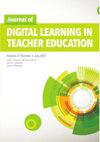Synchronous meetings, community of inquiry, COVID-19, and online graduate teacher education
Q1 Social Sciences
Journal of Digital Learning in Teacher Education
Pub Date : 2021-03-18
DOI:10.1080/21532974.2021.1890653
引用次数: 17
Abstract
Abstract With the arrival of the COVID-19 pandemic in March 2020, teacher colleges across the country suddenly shifted to online. In many cases, faculty, wary of shortchanging students of a meaningful learning experience, leveraged synchronous meetings as a way of compensating for the abrupt removal of face-to-face (F2F) interactions. This mixed-methods self-study explored advanced licensure candidates' perceptions of developing a Community of Inquiry (COI) across three sections of a Spring 2020 online course taught by the same instructor. This course was fashioned as a literature circle about immigrant communities and K-12 schools. In one section, five one-hour synchronous meetings punctuated the shared readings of five book-length ethnographies. The other two sections remained completely asynchronous. Sixty-nine students across the three courses were electronically surveyed at the close of the semester. Fifteen students were subsequently interviewed as an additional layer of data collection. Survey analysis indicated that monthly synchronous meetings did not significantly impact students' perceptions of COI development. Follow-up interviews provided further insights into methods that students perceived as essential for advancing teaching, cognitive, and social presences. We conclude with broad and specific recommendations for better practices and future research for COI in graduate teacher education online coursework in and beyond COVID-19.同步会议、社区问询、COVID-19、在线研究生教师教育
摘要随着2020年3月新冠肺炎疫情的到来,全国师范院校突然转向在线。在许多情况下,教员们担心会剥夺学生有意义的学习体验,他们利用同步会议来补偿突然取消的面对面(F2F)互动。这种混合方法的自学探索了高级许可证候选人对在2020年春季由同一讲师教授的在线课程的三个部分中发展调查社区(COI)的看法。这门课程被塑造成一个关于移民社区和K-12学校的文学圈。在一节中,五次一小时的同步会议打断了对五本书长度的民族志的共同阅读。其他两个部分保持完全异步。这三门课程的69名学生在学期末接受了电子调查。随后对15名学生进行了访谈,作为数据收集的另一层。调查分析表明,每月同步会议不会显著影响学生对COI发展的看法。后续访谈进一步深入了解了学生认为对推进教学、认知和社交至关重要的方法。最后,我们为新冠肺炎及其后研究生教师教育在线课程中COI的更好实践和未来研究提出了广泛而具体的建议。
本文章由计算机程序翻译,如有差异,请以英文原文为准。
求助全文
约1分钟内获得全文
求助全文
来源期刊

Journal of Digital Learning in Teacher Education
Social Sciences-Education
CiteScore
4.90
自引率
0.00%
发文量
15
 求助内容:
求助内容: 应助结果提醒方式:
应助结果提醒方式:


